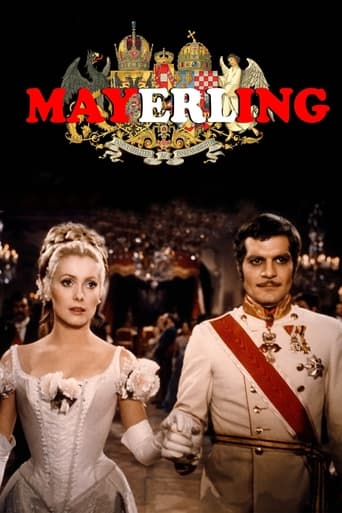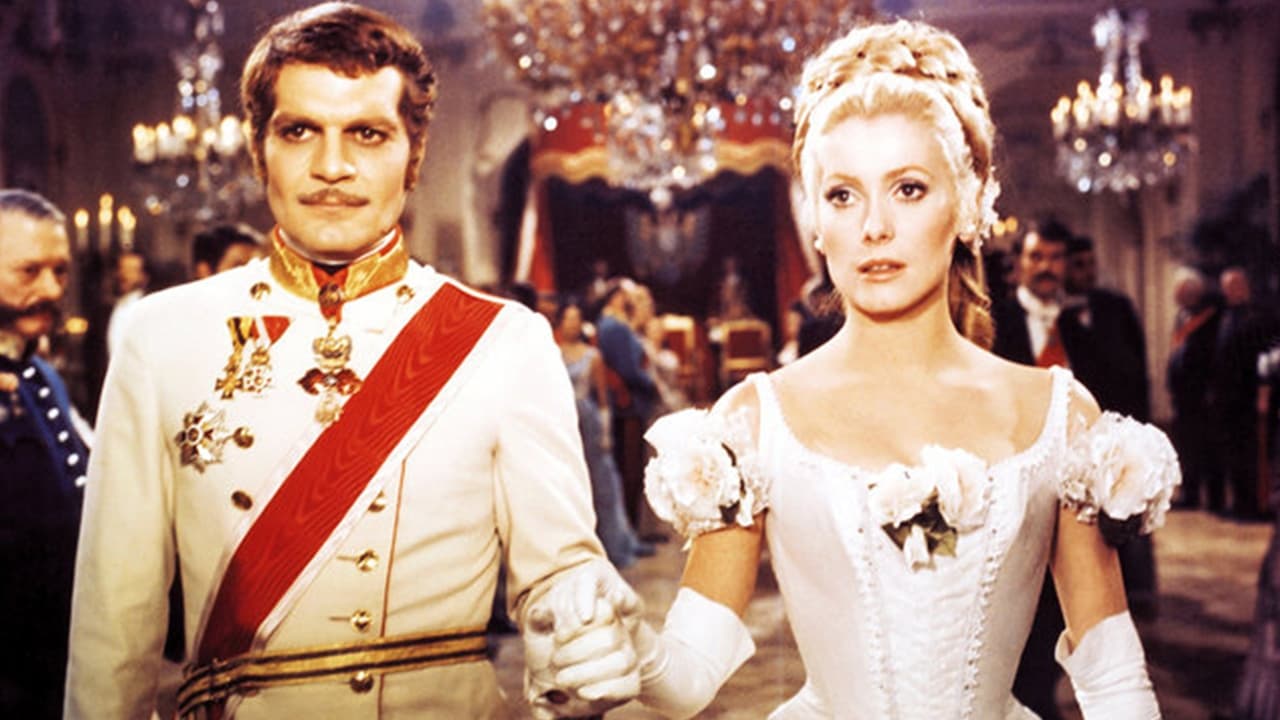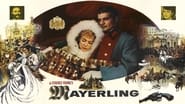Armand
the only sin about Mayerling is the expectation of viewer. because it is only a conventional romance. not profound, not convincing, only beautiful but that is just a detail. a film for fans of actors and for a lot of romanticism from public and solid information about empire situation for be ready to admire a sort of sketch about poor Rudolph and his bitter love story. Mayerling could not represent a real surprise; it is part from a wave who use history as vehicle for noble intentions, impressive budget, nice costumes and precise target who has always the nostalgia of fairy tales flavor. so, nothing special. because it is only a film about a subject from pink novels far by its roots or real signification.
James Hitchcock
The supposed suicide in 1889 of Crown Prince Rudolf, heir to the throne of the Austro-Hungarian Empire, has long fascinated both historians and conspiracy theorists. The official version was that Rudolf died in a suicide pact with his teenage mistress Maria Vetsera, although numerous alternative theories have been put forward. Conspiracy theories normally make for more intriguing cinema that the official versions of suspicious deaths- I doubt, for example, if we will ever see a feature film putting forward the theory that John F Kennedy really was assassinated by Lee Harvey Oswald acting alone- so it is rather surprising that the makers of "Mayerling" (the title is taken from the name of the hunting lodge where the tragedy occurred) have accepted that these deaths really were suicide rather than murder.That does not, however, necessarily mean that the film is entirely historically accurate. As played by Omar Sharif, Rudolf is a contradictory character, a strange mixture of liberal and libertine. In his public life he is the symbol of opposition to his more conservative father, the Emperor Franz Josef, and the advocate of enlightened, progressive policies. In his private life, however, he is a dissolute, alcoholic morphine-addicted womaniser with numerous mistresses; his marriage to the Belgian princess Stephanie is miserably unhappy. There is, in fact, some historical evidence to support this view of Rudolf's character, but the political background to his suicide seems to be an invention of the film-makers. Rudolf allows himself to become drawn into a treasonable attempt to dethrone his father as King of Hungary; his motivation is partly the chance to put his liberal ideals into practice, but mostly the thought that as monarch of an independent country he will be able to divorce Stephanie and marry Maria, something that his father has always refused to countenance. (After the Ausgleich of 1867, which granted Hungary self-government within the Empire, most Hungarians were in fact satisfied with the Dual Monarchy and would not have wished to replace Franz Josef as their king, especially if the rival candidate for the throne were a divorcée, something which would not have been acceptable in a predominantly Catholic nation).None of the leading actors seem altogether believable, the worst offender being, surprisingly, Catherine Deneuve; one would not believe from her withdrawn, passionless interpretation of the role that Maria is a woman so desperately in love that she is willing to die for, and together with, her beloved. Omar Sharif tries harder to make something of Rudolf but without much success. James Mason as Franz Josef often looks as though he wishes he were somewhere else altogether, playing the King (in the words of the old joke) as though someone else had just played the Ace. Ava Gardner's performances during the sixties and seventies were rarely impressive; there were occasional exceptions, but "Mayerling", in which she plays the Empress Elisabeth, was not one of them. Only James Robertson Justice, who plays the Prince of Wales with gusto, makes any impression or shows much enthusiasm.The film is attractive to look at, with lovingly re-created late Victorian interiors and costumes, but it is overlong and lacking in movement; it would have been improved by editing to make it at least half an hour shorter. 5/10 Some goofs. The Prince of Wales states that his mother is eighty-five years old. At the time of Rudolf's death in January 1889, Queen Victoria was actually sixty-nine years old. She never lived to be eighty-five, dying in 1901 at the age of eighty-one. Franz Josef refers to Marie Antoinette as his great-aunt; she was actually his great-great-aunt, being the sister of his great-grandfather the Emperor Leopold. Elisabeth says that she never says "goodbye" because it "sounds too final". The characters in this film would have spoken German, and the German expression "auf Wiedersehen" sounds much less final than the English equivalent. Like the French "au revoir" it translates roughly as "until we meet again", so I doubt if Elisabeth would have made this remark in real life.
ianlouisiana
As good an advert for republicanism as you're ever likely to see,"Mayerling"is an everyday story of royal folk in late nineteenth century Austria.Set during one of Europe's seemingly incessant internal turmoils it concerns itself with the Emperor Franz Joseph (Mr James Mason),his rebellious son,the Crown Prince Rudolf (Mr Omar Sharif)the Empress(Miss Ava Gardner) and various mistresses,secret policemen,spies,extravagantly-uniformed popinjays,gypsies,dancers,wives, soldiers,swans,horses and the bizarre inbred web of European royalty at the time of Franz Joseph's Austro-Hungarian Empire. Filmed in what the old movie posters used to call "A Riot of Color" it resembles nothing more than an expensively-dressed but intellectually-challenged production of "The Student Prince" .Mr James Mason,wearing a very natty little white number,utilises his all-purpose mittel-European accent whenever he remembers.I am a great admirer of his and I sincerely hope the remuneration was comensurate with the distaste he clearly felt for the character he was playing. Mr Omar Sharif,who built a career largely founded on looking directly at the camera with his big brown eyes and looking soulful,gives a stupefyingly monotonous performance as his son the Crown Prince.He is utterly unconvincing as a man who -in the movie at least-cut a swathe through the distaff side of the Austrian aristocracy.With his well-buttered locks firmly in place he preens and poses in ever more unlikely uniforms.As a rebel he talks the talk but conspicuously fails to walk the walk,leaving a bottom button undone on one of his tunics is about as far as his defiance goes.Unhappily married,he falls in love with a commoner."Forbidden Love" is one of the movie's come-ons.As she is played by the most uncommon Miss Catherine Deneuve he is scarcely pushing the envelope there.Miss Deneuve has a profile to die for and we see rather a lot of it,particularly in the sequence set at the ballet. Now I love ballet as much as the next man,but this sequence does seem to go on for an excessive amount of time,a more cynical critic might consider it to be "padding". Rudolf's mother,the Empress is played by Miss Ava Gardner.She gives the part some good old American oooomph,making her a bit like "Auntie Mame",but it's done with undeniable style.Rudolf is certainly very fond of his mother - I'll put it no more strongly than that. The only performance worth watching is that of Mr James Robertson Justice as Sir Lancelot Spratt - sorry,Edward,Prince of Wales.He is so wonderfully unconcerned about everything going on around him it's a joy to behold.I waited vainly for him to ask Rudolf the immortal question "What's the bleeding time?". I am not qualified to dispute "Mayerling" 's historical accuracy,but,in my opinion,everything else about it is risible. It is a Ruritanian Opera Buffa without the tunes to send you home from the theatre whistling.
dbdumonteil
All modern historians agree that it was not the "impossible " love depicted in all Mayerling versions.No Rudolph did not throw away his empire for the love of Mary!He had at the time of his affair with baroness Vetsera other mistresses(the most famous was Mizzi Kaspar).Too bad for those who are still dreaming of romantic passion,but the harsh truth is that Rudolph was a jaded man,using morphine to relieve his sufferings .He was seriously ill,since he contracted a VD.Historian Jean-Paul Bled goes as far as to say he would not have outlived his father anyway(think that his father died in 1916!).Just before his death he was not physically the handsome man played by Omar Shariff anymore!As for Mary,she was seventeen (Deneuve was already too old in spite of her stunning beauty),and she did love Prince Rudolph,but she was too young to understand that she was used by her lover as a helping hand to die:Rudolph had already asked Mizzi(see above) to die with him because he was frightened to pass away ALONE.Another scene is completely refuted by every earnest historian:during the ball in the German Embassy,Mary refuses to bow before Rudolph's wife Stephanie.Or ,absolutely nobody,among these who attended the reception,spokeabout it afterward.The only person who mentions it is Countess Marie Larish,who was not invited,and who was a very shady and perverse lady,who wrote a book called "my past" .And what a past!She was Empress Elisabeth's niece,child of a misalliance:Sissi's brother had married an actress.In the Mayerling saga ,she played a very bad part,that of a go-between(Genevieve Page in the movie)The imperial couple reunited James Mason and Ava Gardner ,who were the leads in "Pandora and the flying Dutchman" (Lewin,1951),a treat for cinema buffs.The cinematography is dazzling,and at least the story was filmed where it took place.Francis Lai's score is nice too(Un Homme Et Une Femme,1966,love story,1970).The director ,Terence Young ,is the movies odd-job man:James Bond (Dr No,From Russia with love,thunderball),the amorous adventures of Moll Flanders,wait until dark,the Christmas tree,spy thriller,horror,melodrama,not a genius but a competent craftsman.After Mayerling,the hunting lodge was razed to the ground and the emperor had a nunnery built on the site.Hence the necessity to film the last part in a studio.Another scene completely made up from start to finish is the Deneuve /Gardner meeting.At the time ,Elisabeth had become the wandering empress she would remain until her death in 1898,nine years after the Mayerling tragedy.She used to shun Vienna,the Court ,the étiquette and even politics.But the movie is true for one thing:she was here when Rudolph died.Marie Larish(Genevieve Page),the go-between, was her protégée,but she would realize too late what a perverse creature she was.Rudolph was a depressed man,who failed twice:politically,he was kept out of things by his father and his plots led to nowhere.He used to worry about the Monarchy's (actually a double one,Austrian and Hungarian since 1867)future and he dreamed of federalism and parliamentary democracy;besides,his marriage was on the rocks,his wife Stephanie(Andréa Parisy) being unable to give birth to another child. The opening scene is the only one which deals with politics:a student riot during which Rudolph is arrested by the police:once again,it's very implausible,since the Kronprinz's actions were watched day and night by Francis Joseph's henchmen.Even his numerous -and almost absent here ,to give the movie a romantic flavor-mistresses used to "help" police reports.The best thing-one user noticed it- is Marie Larish's obnoxious behavior.Genevieve Page is remarkable,acting with Mary Vetsera like a spider with a fly,unbeknown-st to her mother (Mony Dalmes).Outside Litvak's version ,already mentioned by some users,there's also Jean Delannoy's "le secret de Mayerling" (1949),with Jean Marais as Rudolph which has a rather good reputation,in spite of a weird ending:Bismarck was behind the lovers' assassination.Even stranger:when Zita,Austria's last empress ,came back from exile in the early eighties,she hinted at a political assassination as well.


 AD
AD




